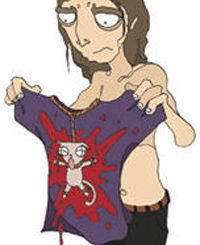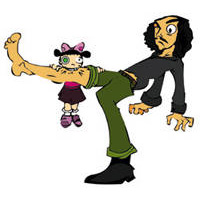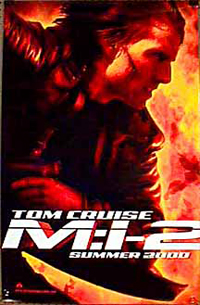 Three Slices of Summer
Three Slices of Summer
Art Stupid
by Adam Haynes
“Okay you fuckers, I’ll take all you out. You’ll be begging to kiss my ass, you’ll be just begging…”
This is just the sort of attitude that a good action movie should have. This is just the sort of attitude that actions movies in this country won’t have until they get their heads out of their asses and start taking no prisoners again.
One of the things that has to happen in order for good action movies to breath in this country again is the annihilation of John Woo.
For reasons inexplicable to me, as well as anyone with even half a brain still functioning, John Woo is getting touted as the greatest action director currently in the game. One of the biggest problems is that we find ourselves in a period of history where there is no competition: Luc Besson has always been too interesting for these simple-minded shores (as last year’s breath-taking The Messenger proved beyond any reasonable and unreasonable doubt), and Rene Harlin is still waiting for the next Long Kiss Goodnight, and that’ll probably take awhile.
But even so, I mean, Broken Arrow? Face/Off? One of the things I’ve always admired about the action genre was how quick it was to lower its and our expectations. but please… Please please please…
These movies make the most recent Van Dammage (the man guilty of bringing Woo over here in the first place, though no doubt the cad would’ve found another way in) whateveritwascalled, look positively decent. That’s scary, brother, and you know it is.
The only Woo movie I’ve honestly liked is The Killer, which I started hating after the second time I saw it (and this brings up a very important and little realized point: That a good action movie will hit all the punches and will sustain the same level of IMPACT upon multiple rewatchings, as any one who’s seen The Road Warrior a hundred and thirteen times will attest).
And now I get to see Woo do Mission Impossible 2. Understand, I really, really like the first outing, mostly because it was the first Brian Depalma movie in years to not outright suck, but also because I think Tom Cruise is great (he’s got that uber-thang which would’ve made Hitler, which makes all saavy gay men, proud). I was looking forward to the sequel with a hunger that borders on obnoxious because I grew up a James Bond kid (if you didn’t know already, in the Gen X world there are James Bond kids and Star Wars kids, and the two shall never mingle) and really saw the Mission Impossible franchise as a way to take Bond into the next century, seeing as the Bond shit itself could no longer keep going for a multitude of reasons too profound and nerdy to get into here…
…So like any good action film-goer, and like any nonretarded watcher of Woo’s previous work, I went to MI:2 with expectations only slightly above mininal.
…And I don’t know what to tell you, dear reader. Obviously, there was shock. Obviously, there were peroids of extreme bordom. I think what blows my mind more than anything else is the fact that Battlefield Earth has been getting such crushing reviews (and it deserves them all, for sure) while MI:2 has done so well. Both movies are equally bad, equally deserving of Worse Film of the Decade or whatever.
But for some reason, Woo has been painted the rose of Hollywood. I’ve actually — and I’m really not kidding — been reading reviews that gush over Woo’s use of slow motion, over the way he puts scenes together like it was ballet or something of equal frill and gallentry. Have I not been drinking the contaminated water here? Is everyone else getting paid off?
What it seems to come down to is the general consensus that Woo is an artist, and that he’s doing something artistic with the action genre. Okay, okay… I’ll buy that… But Woo over-directs his already simpleminded tales to the point of absurdity (which I think many mistake for some sly statement on his part, but statement about what?) and stages all of his indoor gun fights in what always looks like the same factory/cargo lot pulled from some A-Team episode, and uses the aforementioned slow motion to further emphasise the dead horse which is still dead. And don’t forget all those doves which — always in the third act — flutter with as much energy and zeal as they did in the Prince video they were stolen from, where they were already tired… Those doves symbolize our own never-ending tendency to gladly present ourselves as whipped chimps before the lightning projector of what we want — the wild Dionysian orgy of engery and what-we-now-call-sin then catharthis — so badly that we’ll forfeit what little intelligence still glimmers in the periphery…
And John Woo is an artist for our current temperement. And I’m idiot for trying to shoot him down. But at least I’m not stupid, and history shall bear me out.
Keri Russel
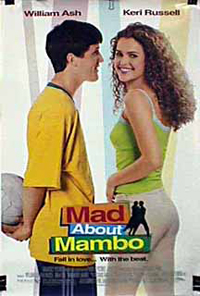 Mad About Mambo is a slick little European independant movie that aches to carry the plastic-mall-afternoon-sunshine affectation that all the new school teenage rocoms these days drip with. But at the same time, it tries to slyly remain rooted in its own provincial ethnocentrism by playing its whole tone and feel as something just to the bubbly left of precocious. This all has something to with what you get when marketing and integrity decide to go to bed together, even in Ireland. Maybe especially in Ireland.
Mad About Mambo is a slick little European independant movie that aches to carry the plastic-mall-afternoon-sunshine affectation that all the new school teenage rocoms these days drip with. But at the same time, it tries to slyly remain rooted in its own provincial ethnocentrism by playing its whole tone and feel as something just to the bubbly left of precocious. This all has something to with what you get when marketing and integrity decide to go to bed together, even in Ireland. Maybe especially in Ireland.
But whatever… The story’s about this teenage guy in Belfast who really wants to join the local semi-pro soccer team, and then for reasons which don’t really matter, decides to learn mambo dancing to help him with his, uh, form. This is where he meets the girl and all that cut-and-paste romantic stuff begins, and then eventually ends in a way that is neither surprising nor very gratifying, seeing as the last third of the movie becomes arbitrary to the extreme: all characters get squashed under formal idiot-give-them-what-they-want formula.
There’re a lot of class and religious problems addressed, which generally wins because they never turn into easy soap box revelries since they spend most of their time lurking just beneath the cardboard interactions. Brian Cox, who plays the girl’s dad (he was brilliant in last year’s Minus Man), does a wonderful impression of Albert Finney, pumping out enough genotype grit to counteract his character’s otherwise canned sweetness.
The movie is much more thoughtful than most of the teen rocoms I’ve seen, which should make it automatically worth recomending, but it completely blows apart in the end because the message of the whole thing — something along the lines of: take risks, go for it… you get the idea — is completely at odds with how the story itself gets resolved: it takes no risks, breaks no ground, challenges no one.
Of course, none of this even matters because Keri Russel plays the girl and that’s the only reason anyone is going to see the movie anyway. It’s also the only reason anyone should see the movie, ultimately. There’s a peculiar soft light which shines on Keri Russel, which makes her stand out from all the other little young things her age. I’ve noticed this light ever since I first saw her on that TV show, Malibu Beach. Russel isn’t much of a dancer (though this could be the lousy direction on John Forte’s part — he makes all the dancing scenes as much fun to watch as toothbrush commercials), and she isn’t the best at faking an Irish accent (it comes and goes like a stray cat), but there’s something about her which is arresting in this very, well… soft way. And that’s quite a combination if you think about it: hard-hitting heavy impact on one hand, constantly emoting such feather lightness on the other. Her acting, even with such flimsy material as this, is focused and strong, while at the same time never lapsing into the rigidity or automation that often mars the less natural, more over-acheiving of her generation. But what really allows her to sink deep into the viewer’s skin is this vapid peevishness that shines out of her eyes that’s all magazine glossy and completely inpenertrable. If in the future she chooses her parts on character preference and intuituion, rather than whatever her agent tells her, she could go all the way to the top. Until then, she’ll have to remain the big fish attraction in little bowls such as… what was it called again?
John Waters Could Save Your Life
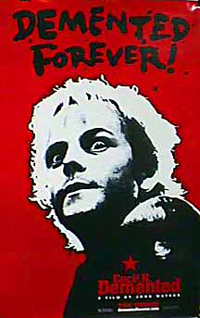 I’ve never known what to make of John Waters. When I was a kid, I heard all these stories about what a disgusting and outrageous filmmaker he was. On my twelfth orbit, I saw Hairspray and loved it, mostly because I felt so cool to watch a movie which wasn’t as harsh and disgusting as I thought it’d be. Then I saw a little of Polyester, and it made me sick. Not because it was disgusting, but because I’d never seen a film that was so intentionally trying to be crappy and unprofessional. A little while later, I stumbled into a room at a friend’s house while Pink Flamingos was on. This time I was disgusted by the disgusting things happening, really grossed out. I lasted about fifteen minutes or so before splitting, feeling totally uncool and unhip. Sometime between then and now, I think I saw some of Water’s early offspring, but they were too boring to register.
I’ve never known what to make of John Waters. When I was a kid, I heard all these stories about what a disgusting and outrageous filmmaker he was. On my twelfth orbit, I saw Hairspray and loved it, mostly because I felt so cool to watch a movie which wasn’t as harsh and disgusting as I thought it’d be. Then I saw a little of Polyester, and it made me sick. Not because it was disgusting, but because I’d never seen a film that was so intentionally trying to be crappy and unprofessional. A little while later, I stumbled into a room at a friend’s house while Pink Flamingos was on. This time I was disgusted by the disgusting things happening, really grossed out. I lasted about fifteen minutes or so before splitting, feeling totally uncool and unhip. Sometime between then and now, I think I saw some of Water’s early offspring, but they were too boring to register.
So okay, my impression of John Waters was a peculiar sort of respect. After all, I’ve seen more movies than God, so when someone puts out something that actually gets under my skin this late and jaded in the game, I take notice (or flee, as the case may be). But does that mean the guy’s any good? I mean, look at Cry Baby, Serial Mom, and Pecker. These films are neither gross, weird, nor very good. They’re soft when they should be edgy, easily moralistic when they should be, well, something else…
And how do you even go about interpreting John Waters anyway? After all, interpretation is all about lumping things together with great generalities and all that academic stuff. Waters has no generation to lump with, no genre to hug the knees of (you might say his genre is trash, but whatever). You could say that he was intregal to inspiring the No Wave movement of the mid-’80s, but so what, right?
Of course, all this means that my respect for the man only grows and grows. Especially last year when I heard an NPR interview between him and Fresh Air’s Terri Gross (who, if you haven’t already figured it out, is to media feminism what Pop Tarts are to pastry) where he started talking about how he couldn’t relate to the youth culture of today with all the piercings and tattoos. It was so great. I’m so sick of old hipsters kissing the ass of the next generation.
…Anyway, I guess the only problem I really had with John Waters was that he never made a movie I really liked, one that lived up to the fire of those stories I’d heard as a little tyke and combined intelligence with the Derridaish, circumventing of the whole standard picture frame bullshit. I mean, I’ve already mentioned Cry Baby, Serial Mom, and Pecker — these films are sweet enough, but please, they reek of prissy underachievment.
So when I went to the press screening of Cecil B. Demented, I really didn’t have any expectations. Well, that’s not true: I was expecting that this movie wouldn’t suck as bad as most of the movies I’ve seen this year. I was well aware that that little pimpy rat motherfucker — what’shisname… Brad… No, Stephen Dorf — was headlining, so there wasn’t much faith there at all. Plus, the movie, from what I’d read in the shit the publicity people send out, was about filmmaking and the film industry. More than anything else, even more than Meg Ryan, I hate movies that are about movies. So I take back everything I just said. There was more than a little bit of dread in my gut when the lights went down.
When the lights went down…
Can I tell you, can I even begin to describe how happily surprised I was? What to say… Cecil B. Demented is easily the best movie you’ll see this year. And while I may be going out on a Shirley McClane here, I wouldn’t be surprised if it’s the best movie you’ll see this year or next. There…
Okay, plot: There’s this big Hollywood actress in Baltimore doing some kind of promo or something and she gets kidnapped by this guy and his little army of misfits who’re film terrorists, and very much like the whole Patty Hearst thing (which Waters must regard as some sort of seminal event — I mean, why else would he keep putting her in his movies?), they put her in an indie/art film that attacks the very structures of all that Hollywood holds sacred.
I know, I know, there’s nothing about the plot that makes you want to check it out, but trust me, the execution is amazing. Why? Because Waters is not only skewering all that Hollywood holds dear (taking a lot of easy shots I normally wouldn’t respect at all, except he does them so well — for example, having Kevin Neelan star in the sequel to Forrest Gump), but the sweetheart also goes after the independent/art movie scene in a way that’s totally honest and completely refreshing. What I’m saying is that everyone gets roasted in this picture and that Waters has made a movie that’s somehow self-reflexive without going into postmo-ironic nonsense.
It saved my life watching this movie, it really did.
And then, of course, there’s Melenie Griffith who’s had my heart tied away ever since I saw her blow her magic dust all over Something Wild when I was just a boy. She’s never gotten any respect, and I hate to say it, but it’s probably because she’s got that porn star little girl voice. And that’s Hollywood for you. But here, as the kidnapped actress, she ties everything together. Shit, she even makes Skeet, I mean Brad, I mean Stephen Dorf, look excellent when he’s reciting next to her. There’s something about the way she turns a phrase, the way she casts a look, the way she seems to be in on the whole joke and completely oblivious at the same time… it’s just amazing. It’s exactly what Water’s needed to tie the tone together. It’s exactly what he’s been missing ever since Divine passed away. Keri, if your still reading, you’d do well to review her catologue and take copious notes.
I don’t want to sound like a complete nerd here, but Waters must’ve read some books on directing because Demented is the most visually expressive of all his output. It’s like he finally decided to stop hating the camera, or separate the camera from the audience, or something. Who knows? Gone is all the very ha-ha clunkiness of earlier efforts, replaced now with a sort of dangerous rhythm that would’ve easily reminded me of Fassibinder if I hadn’t flunked out of film school.
Watch it and watch out — there can absolutely be no more independent shit, all the independent shit which is really just Hollywood wanna-be shit will now no longer be able to hide in its Sundance sheep’s clothing — the bar has just been raised. Let me repeat that, the bar has just been raised. I’m so happy we can finally move forward.


